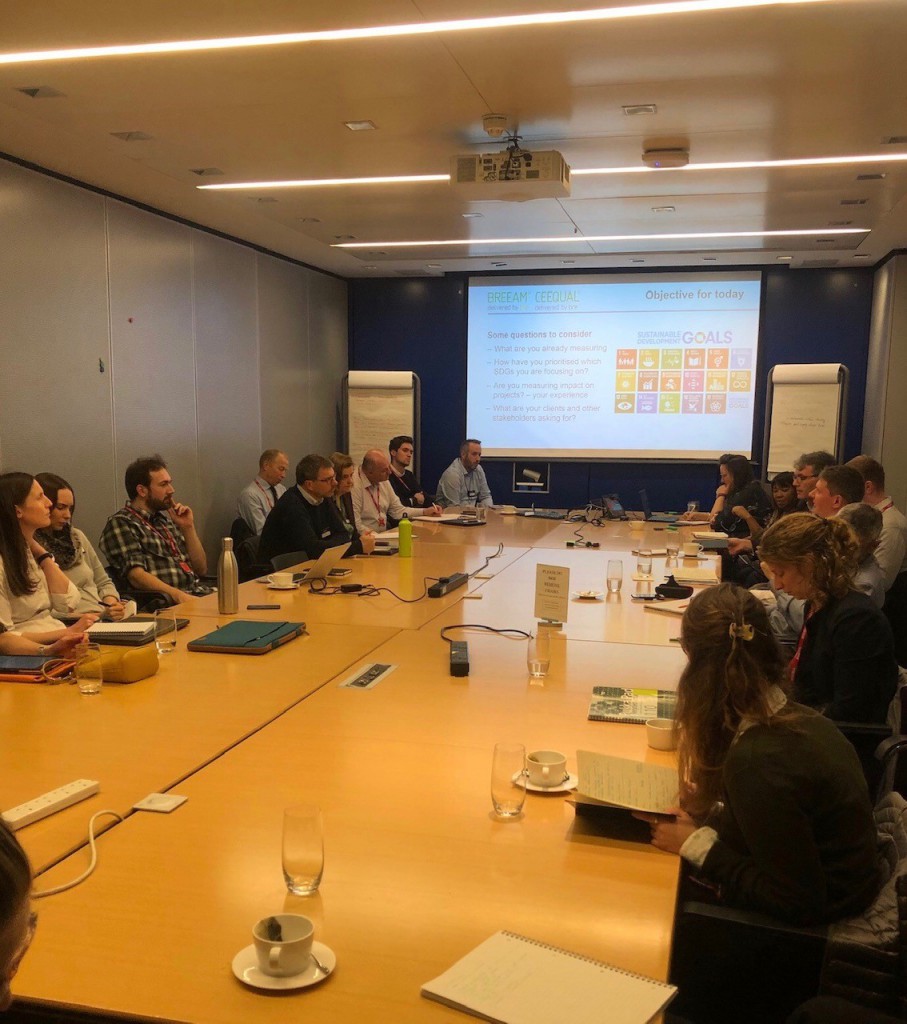Briefing note: Constructing Excellence Sustainable Infrastructure Forum – Sustainable Development Goals workshop
23rd January 2020, Arup, 8-13 Fitzroy Street, London, W1T 4BQ
Background
On the 23rd January, the Sustainable Infrastructure Forum gathered for its second quarterly meeting, with a focus on sharing & discussing best practice and lessons learned supporting the integration of the Sustainable Development Goals (SDG’s).
A key objective of the forum is to share & capture experience from the group members and develop supporting guidance around the integration of the SDG’s into the infrastructure sector.
Presentation summary
The forum began with a presentation delivered by Tim Chapman, Arup looking at the SDG’s in the context of low carbon infrastructure. Fossil fuel consumption has contributed positively to progress of SDG 1 to 12 around the world, but this has had a huge detrimental impact on the natural world SDG 13 to 15. SDG 16 & 17 highlight the importance of governance in tackling key global issues. Decarbonising transport, PAS2080 whole life carbon assessment is a key to moving forward. Climate mitigation & adaptation essential & time is running out to stay below the 2 degrees threshold.
Ian Nicholson, Director of CEEQUAL & Infrastructure at BRE presented on measuring impact infrastructure has on SDG’s. Challenges highlighted looking into how we can measure against 230 indicators which were developed for Global action & weren’t intentionally written for the infrastructure sector. The need for careful interpretation is key, especially with regards to what the SDG’s mean for particular types of projects. Key considerations such as: how to prioritise the SDG’s; cascading of SDG’s within organisations & externally through supply chains is essential.
Karl Fuller, Environment Agency presented the guiding principles for SDG project appraisal. A number of issues exist around the practicality of adopting strategy focussed on SDG’s, and the importance of being clear on the purpose of an SDG appraisal & what value it adds. Effective communication across disciplines & a participative approach is essential. Being clear on where benefits & impacts are being delivered in relation to the baseline, not just mitigating adverse impacts; taking ownership for the benefits & negative impacts. Supporting claims with evidence & independent assurance. Providing a sense of scale & significance of the claims being made. Finally, using appropriate language & statements supporting what is being delivered.
Workshop summary
The workshop delved into questions surrounding how we ensure robust reporting and evaluation against SDGs and what principals should be used to evaluate SDGs in the infrastructure sector. Four questions were asked to the working group to discuss & feedback. Summary of questions & responses included:
- What are you measuring?
Experience shared from a consultant perspective being asked for SDG requirements, but concern raised around using data effectively. Important to look at process against project goals. Linking global aspirations, implementing at project level & reporting back up to system level. Consistency is key, and schemes such as CEEQUAL have defined many criteria in place. - How have you prioritised the SDG’s you’re focussing on?
Important to go through all the SDG’s, select, prioritise & define what’s already in place at project & corporate level. It appears project experience is mixed and very few are measuring SDG criteria consistently. Carbon is a key focus for alignment across industry. BREEAM & CEEQUAL seen as positive to get the standard & consistency of reporting through the methodologies. Prioritisation of SDG’s depends on a number of factors, such as: scale & type of project, local context & priorities, but also the transboundary impacts at a local & global level. - Are you measuring impact on projects – your experience?
Measurement is sometimes more qualitative than quantitative. Scale has historically been a key factor, with larger projects going beyond just an EIA & heavy recording of environmental impact. Carbon & social value not fully defined & mature as a discipline – needs to get better recognised as a discipline. Consistency & being able to compare one project with another is fundamental. Consideration that smaller clients/ projects often do the minimum, whereas larger projects need greater public buy-in. - What are your clients & other stakeholders asking for?
Generally responses mixed, with some asking for it, but depends largely on the project tendering & quite often very few specific requirements are written into tenders. Question for procurement & the role of sustainability professionals within this, such as are the tenders being assessed & who by. Having an informed client is key to ensure having the right requirements in the contract & ensuring implementation at project level. In terms of where drivers are coming from, seeing investors asking the question & not always the client, investors perhaps take a longer term view.
Next steps
Following outcomes from this forum, this will feed into the ICE working group, & the next forum will be scheduled around April with a theme following on looking into behaviour & procurement.


Comments are closed.